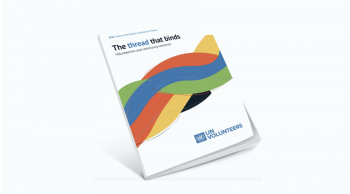Volunteers tie communities together because they are active in every major shock and stress communities experience, from earthquakes and flooding to climate change and local conflicts, finds the new 2018 State of the World’s Volunteerism Report.
Ben Lough, the Center for Social Development’s faculty director of International Service, led the research and writing of the report, presented July 18 at the United Nations High-level Political Forum in New York.
The report draws on original research across five continents. Findings show that adequate support and resources are critical to ensure that volunteer groups and networks can cope with shocks and help to prevent future crises. Also, ensuring access to volunteering opportunities ̶ including for those who prefer to volunteer informally ̶ is necessary for communities to become optimally resilient.
You may download the State of the World’s Volunteerism Report: The Thread that Binds and/or watch a summary of key findings of the report. Here a few:
- The global volunteer workforce exceeds the number of people employed in more than half of the 10 most populous countries.
- The majority of volunteering globally (70 percent) is informal.
- Women take on 57 percent of all volunteering globally.
As background for the report, Lough also co-authored a paper summarizing findings of the state of volunteering infrastructure globally. Global Trends in Volunteering Infrastructure draws on survey findings from regional UN Volunteer offices, field units and focal points – spanning more than 100 UN Member States. It asserts that an inclusive volunteering infrastructure is necessary to enable people to become agents of change and drivers of their own development. It also shows that not all volunteering infrastructure is positive and that some interventions can have negative consequences for volunteerism by being restrictive, repressive and exclusive.
Recommendations from both reports assert that investments by governments and civil society are necessary to help ensure protections and incentives people need to participate fully in voluntary action.
The reports and related research reflect wider investments by CSD in a Global Research Agenda on Volunteering for Peace and Development (GRA), a tripartite partnership between CSD, the United Nations Volunteers (UNV) program and the International Forum on Volunteering for Development. The GRA provides a framework by which researchers can work together to leverage the full potential of volunteering through more effective measurement, research and articulation of the benefits and drawbacks of volunteering for sustainable peace and development.
